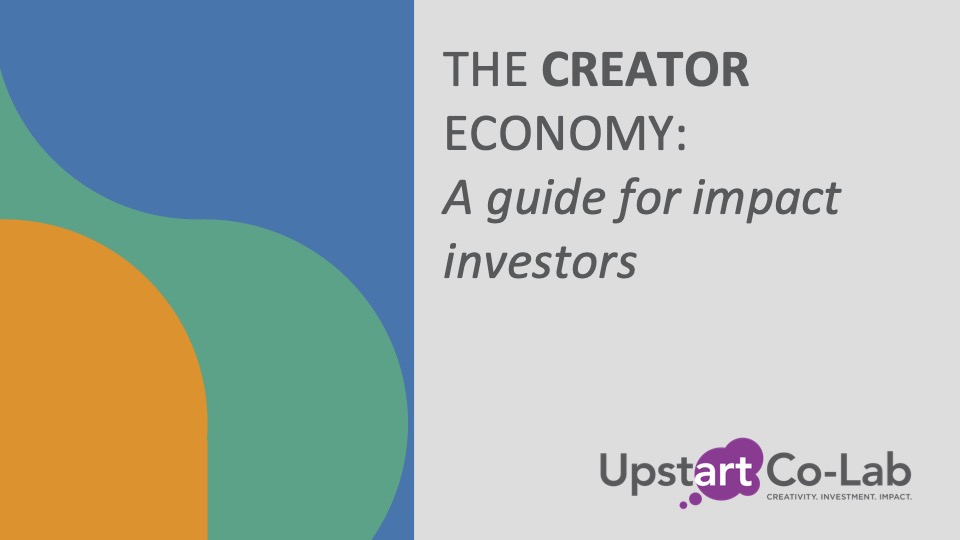The Creator Economy: A guide for impact investors

View the Report
Download the Report
Overview
The “creator economy” is the online ecosystem of platforms, products and services that enable independent content creators to make their work, build their audiences, monetize their ideas, and manage their careers. Technology is transforming how creative work is produced, distributed, compensated, and enjoyed — while simultaneously expanding who gets to tell their stories and who sees their own experiences represented online. Upstart Co-Lab believes impact investors can play a role to ensure the values of diversity, equity, inclusion and access are prioritized in this rapidly growing sector.
The latest in a series of deep dives into key creative industries, this report looks at a fast-growing segment of Upstart Co-Lab’s pipeline of impact investment opportunities in the U.S. creative economy.
Key Findings
The creator economy deemphasizes traditional gatekeepers like producers, editors and gallery owners by giving creators direct access to their audiences and, ostensibly, reducing barriers to creative careers for currently marginalized groups. By equipping creatives with the tools of entrepreneurship, the creator economy offers new pathways to wealth building and the promise of a “creative middle class.”
However, there are challenges to delivering on this potential:
- More people have access to become money-making creators, but the most successful creators and their content do not reflect the diversity of the U.S.
- While there is a lot of money being made, earnings are not flowing equitably: top creators and traditional gatekeepers are harvesting most of the profits, exacerbating inequalities by race, gender, and geography.
- The creator economy promotes individuality flexibility, and freedom of expression; however, the ecosystem fails to ensure creator wellness, especially related to mental health, bullying and harassment.
- In addition to the treasure trove of content with something for every audience, there is a preponderance of low-quality, addictive material.
Opportunity and Impact
The market size of the global creator economy is estimated to be at least $100 billion. Leading venture capital firms like Andreessen Horowitz and Tiger Global have validated the investment potential of the creator economy, backing hundreds of startups and building at least 15 “unicorns” with >$1b valuations.
Upstart sees a tremendous opportunity for impact investors to help provide the guard rails and incentives that will secure the values of diversity, equity, inclusion, and access for the creator economy as it continues to grow.
The creator economy is ripe for foundations committed to narrative change, diverse storytelling, and free expression; art collectors and art workers who have been asking for impact investment opportunities connected to art and culture (per a 2021 survey from Deloitte); and museums and other cultural institutions that are beginning to engage their endowments in alignment with values and mission.
Creator economy startups hold significant impact potential; impact investors can invest in private companies via VC funds, angel investments, and crowdfunding.
Public companies supporting the creator economy rank well on ESG criteria and offer competitive returns; investors can take an active stakeholder role to amplify their values.
Implications
Factors affecting the creator economy in 2023 include technology sector volatility, crypto market shocks, and a more cautious investment environment with less capital moving to young companies and new ideas.
While Upstart Co-Lab believes that content, culture and community will play a major role in the 21st century — and that intentional engagement by impact investors can ensure the related economic benefits are shared equitably and sustainably — the creator economy is a nascent and quickly evolving sector and there remains much to learn.
Upstart’s new Inclusive Creative Economy Strategy will be closely considering opportunities to invest in the creator economy.
This research was supported by Halloran Philanthropies.
